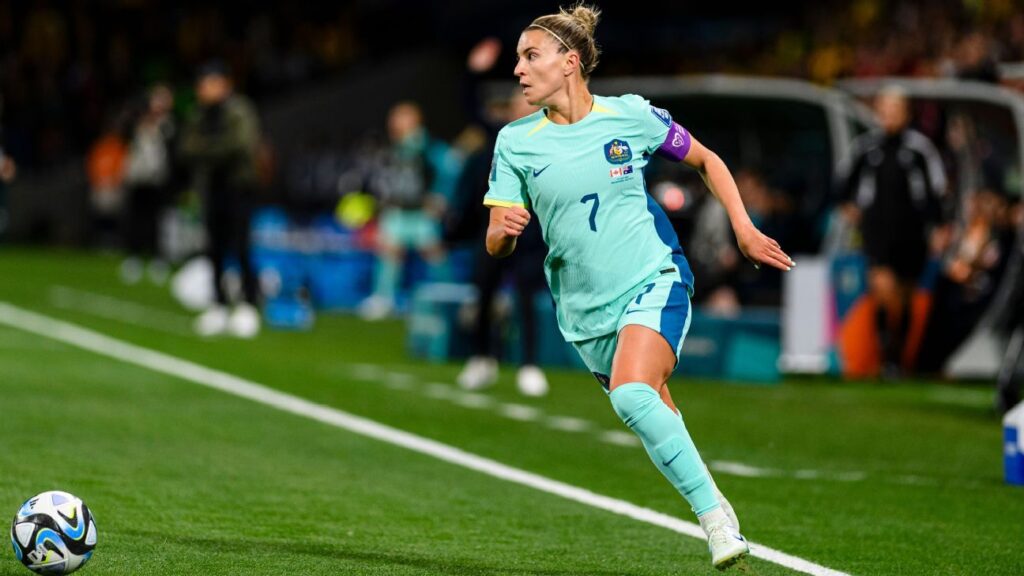As the world became enraptured with the ‘will she play or won’t she play’ saga surrounding Sam Kerr’s troublesome calf, Steph Catley went about her business for Australia. Without much fanfare, and with even less fuss, the 29-year-old defender stepped up to don the armband and lead the Matildas into the knockout stages of the FIFA Women’s World Cup. When the side needed her, she was there.
Catley’s 52nd-minute penalty rescued things against Republic of Ireland in Australia’s opening game of the tournament, as the prospect of commencing a home World Cup with a damp squib of a result against pugnacious opponents began to threaten. Rifled into the net, it was an effectively unstoppable effort, which became more contextually impressive as the tournament featured a wave of missed and fluffed penalties in the days that followed.
Then, after the disappointment of a 3-2 defeat by Nigeria that put the campaign on a knife edge, Catley was at the forefront of the rescue mission against Canada, helping to bring a capacity crowd to its feet as an increasingly rampant green-and-gold outfit stormed into the Round of 16.
Maybe it’s the clutch gene, that special quality that imbues an athlete with the ability to rise to the occasion when others would not; it’s something impossible to quantify or identify that correlates only with the output produced when the air is thickest.
– Women’s World Cup: Home | Squads | Fixtures | Podcast
“Steph and Sam have worked as a pair when captaining this team, a captain and a vice-captain,” Matildas coach Tony Gustavsson said. “And they complement each other really well because they’re different, with unique skill sets both as players and people.
“They bring up the best of each other as captains of this team. And with Sam’s absence on the field [Catley] has taken a massive responsibility on the field and really, really carried a team. There were a couple of huddles [against Canada], where Steph was just leading and communicating and directing and staying composed.
“If there’s one player that always stays composed and one person that always stays composed, it’s Steph. She’s so mature and humble; both feet are on the ground but she’s also a winner. She loves to win and play good football with a fighting spirit and she’s mentally a very, very strong soul.”
Maybe everyone should have seen that performance against Canada coming, because Catley is on a pretty good run of games at her hometown Melbourne Rectangular Stadium.
Back in March 2020, playing in one of the first what would soon become very regular behind-closed-doors games, Catley was the only scorer as Melbourne City defeated Sydney FC in the A-League Women’s Grand Final. Just over two years later, the former East Bentleigh Soccer Club junior started at centre-back as the Matildas romped to a 4-0 win over Olympic silver medalists Sweden. And then on Monday, with a fertile ground to till, she went to work again.
The Matildas had to press the initiative and impose themselves on Ireland and Nigeria in their opening two games — against opponents content to sit back, soak up pressure, and divert their increasingly hit-and-hope play away from dangerous areas — but Hayley Raso’s early goal on Monday shifted the dynamics of the match against Canada; the goal put Canada into third in the group on the live table, and the Matildas were in a position where they, and Catley, could feast.
Catley’s presence imbues the Australian squad with a level of tactical flexibility and the ability to play in multiple formations; she can move central and fill in the centre-back role in a back four or a back five — a quality prized by Gustavsson. In the 4-4-2/4-2-2-2 formation that has become somewhat standard under the Swede in 2023, optimal deployment — thanks to the emergence of Clare Hunt in the middle — has seen Catley take up position on the left side of the defence. And it’s here where the stand-in skipper’s attacking abilities can shine, even if they can, at some points, be overshadowed by Ellie Carpenter’s abilities on the opposite flank.
Canada were now in a position where they had to chase the game to remain alive, but they were unable to breaking down the Matildas’ defensive front: A third of Canada’s 48% share of controlled possession, per FIFA’s stats, was spent knocking an uncontested ball around harmlessly, and they were picked off almost at will by Australia. Ending the game with 33% of the ball (19% was spent in dispute), the Matildas, in turn, spent a third of that time launching forward in transition, and, most of the time, looked threatening as they did. Indeed, when Australia play games on these terms, it’s not hyperbolic to say they can probably beat anyone in the world.
Catley was a force against Canada, combining with Arsenal teammate Caitlin Foord, who had been shifted to the left side of the attack in the wake of Mary Fowler’s return to the squad and deployment up top. Half of Australia’s entrances into the final third came down the flank of Catley and Foord, as did the vast majority of their line breaks. Transitioning rapidly up the field after Canada attempted to counter an Australian corner, the duo were integral in creating Raso’s opener, and later they combined for the third goal, by Fowler, that effectively killed the game in the 58th minute.
“Caitlin and Steph have a unique relationship and understanding when they play together — so do Caitlin and Sam [Kerr] when they play up top,” Gustavsson said post-game.
“Caitlin has been really good as a forward, especially when pairing up with Sam with those combination plays. We felt we wanted to invest in the left-side combination, but also because both Mary [Fowler] and ‘EvE’ [ Emily van Egmond ] have been really good as, if we talk tactical terms, false nines. So we played a little bit differently.”
Gustavsson deserves credit for his adjustments in personnel for the evening, but the performance on a broader level didn’t really answer footballing questions so much as mental ones. We know how good the Matildas are when they can play on their terms, but we still don’t know they are as the proactive side in possession or when they have to find an answer after falling behind a goal — especially in the crucible of knockout football against top opposition.
But Monday showed there was a level of mental strength in this team, and the ability to meet the challenge with backs against the wall. One needed only to listen to Canada coach Bev Priestman admit her side had no answers and didn’t have enough belief to clock that. And there should be little doubt that, as a stand-in skipper, Catley deserves credit for this.
Getting just rewards for her performance, Catley drove home her side’s fourth from the penalty spot in stoppage-time. The stakes weren’t as high as against Ireland, but the result was the same: A thunderbolt of the unsavable variety.
“It’s a privilege to coach this team and when you have a captain play like that, that leads the team like that,” Gustavsson said. “Steph has been amazing and I’m really happy for her to not just score one goal, but two goals [at a World Cup] and to score here in Melbourne in front of friends and family as well.
“We get happy and proud; it’s the culture of the players when we get moments like that.”




